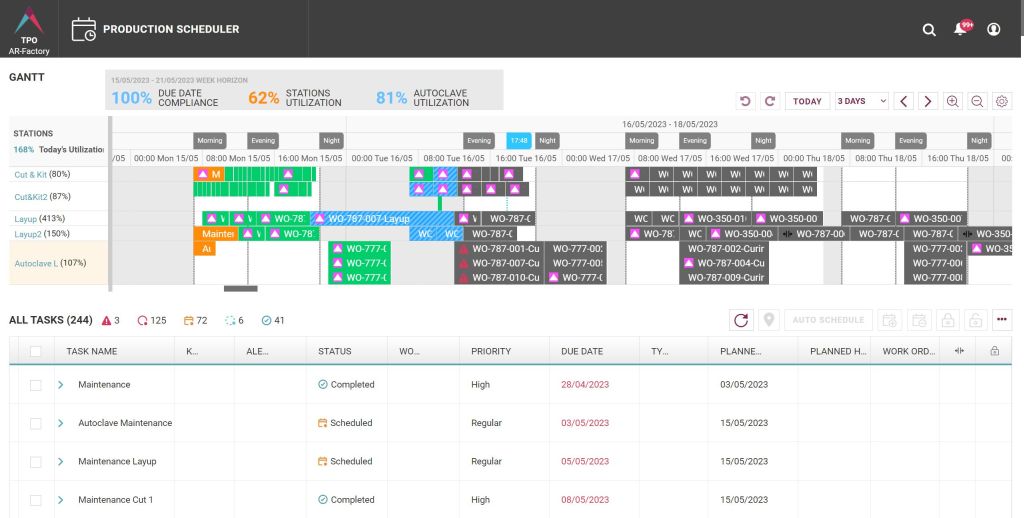Mastering production planning optimisation

In this article, AI software solutions specialists, Plataine highlights the significance of production planning optimisation in composites manufacturing.
In the swiftly changing world of manufacturing, the importance of optimising production planning cannot be overstated. It's the backbone of operational excellence, a critical factor in staying competitive, and ensuring customer satisfaction. Let’s delve into the world of production planning optimisation, and explore its significance and offering strategic insights to streamline your production scheduling and planning processes.
In the specialised field of composites manufacturing, the significance of Production planning optimisation cannot be overstated. This sector, known for producing high-strength, lightweight materials used in a variety of industries from aerospace to automotive, demands meticulous management of resources to meet precise customer specifications. The optimisation process in composites manufacturing involves a detailed orchestration of unique materials, specialised workforce skills, and advanced machinery, all while adhering to strict quality standards and minimising material wastage. By efficiently aligning these factors, companies can ensure not only cost-effective production but also the innovation necessary for developing cutting-edge composite materials.

Furthermore, effective production planning in this field directly impacts a company's ability to compete in a market that values precision, quality, and sustainability. Optimised production schedules and resource allocation lead to reduced lead times and improved productivity, making a tangible difference in a highly competitive landscape. In addition, with the growing focus on environmental sustainability, efficient production planning helps in minimising the ecological footprint of manufacturing processes. Excelling in production planning optimisation in composites manufacturing is thus not just a matter of operational efficiency; it's a strategic imperative that drives innovation, customer satisfaction, and sustainable growth in a rapidly evolving industry.
Streamlined scheduling
Optimising production scheduling is particularly critical in the composites manufacturing industry, where operational efficiency and responsiveness to market needs are key. This process requires a nuanced approach that aligns the unique demands of composite manufacturing with available resources, including specialised machinery and skilled labour. A practical and efficient schedule is crucial for maximising output while avoiding resource strain. Advanced production planning optimisation models, harnessing the power of algorithms and data analytics, are instrumental in this sector. These models provide the capability to anticipate various production scenarios, pinpoint possible production delays or resource shortages, and optimise resource allocation. This ensures seamless production flow and adherence to delivery schedules. Moreover, their flexibility in adapting to sudden market shifts or supply chain issues is invaluable, enabling quick adjustments to production plans. Such streamlined scheduling is essential for maintaining the agility and resilience of composite manufacturing operations, positioning them to successfully navigate evolving industry demands and challenges.
Adopt the right strategy
Adopting the right strategies for production planning optimisation can lead to significant improvements in efficiency and cost reduction, while also enhancing product quality and customer satisfaction. Here are some practical strategies:
Adopting Lean Manufacturing Principles: a strategic approach that focuses on streamlining production by systematically reducing waste in every form. This methodology emphasises not just the elimination of obvious waste, but also the identification of less apparent non-value-adding activities. By applying Lean principles, manufacturers can scrutinise their production processes to uncover inefficiencies such as unnecessary steps, redundant movements, or overproduction. The goal is to create a more streamlined, efficient workflow that maintains, if not enhances, productivity levels. This continuous pursuit of efficiency not only optimises resource utilisation but also contributes to a more agile and responsive production system, better equipped to adapt to changing market demands and customer needs.
Continuous improvement in production planning: key to achieving operational excellence, involving a persistent effort to evaluate and refine strategies. This approach ensures strategies meet current demands and adapt to future changes, leading to 100% visibility in production processes and better on-time delivery. Full visibility allows for real-time tracking of the manufacturing process, from supply chains to order status, facilitating early problem detection and corrective action, like quickly restocking raw materials to prevent delays. Regularly updating production plans ensures accurate forecasting of completion and delivery times, enhancing customer satisfaction and bolstering the company's reputation for reliability and competitiveness.
Flexibility and scalability: essential for effective production planning, allowing systems to adapt and grow with changing market demands and production capacities. Scalability means a production system can efficiently handle varying demand levels, increasing output during peak periods and scaling back when demand drops, without losing efficiency. Modern production planning tools, like advanced scheduling software, are crucial in achieving this scalability. They analyse data to forecast market trends and adjust production schedules proactively, identifying potential bottlenecks and areas for process improvement or expansion, ensuring the production system remains both flexible and scalable to meet evolving business needs.
Quality Control: ensuring a high standard of quality throughout the production process is crucial for any manufacturing operation. Quality control is not merely about meeting the end requirements of a product; it's an integral part of every stage of production, from sourcing raw materials to the final assembly. By implementing rigorous quality control measures, manufacturers can significantly reduce the incidence of defects and inconsistencies. This proactive approach to quality management means that potential issues are identified and rectified early in the process, thereby reducing the likelihood of costly rework or returns. Not only does this contribute to overall efficiency and cost savings, but it also enhances customer satisfaction and trust in the brand, as consistently delivering high-quality products solidifies a company's reputation for reliability and excellence in the market.
Embracing and integrating technology: particularly Artificial Intelligence (AI), into production planning strategies significantly enhances the capability to gather, analyse, and act on vast amounts of data. AI stands as a cornerstone in the modern manufacturing landscape, offering unparalleled insights and efficiencies.
The power of AI in production planning lies in its ability to process and interpret complex data sets far beyond human capability. AI algorithms can analyse historical production data, current market trends, and predictive models to optimise the production schedule. This means that AI can forecast demand more accurately, anticipate potential disruptions in the supply chain, and suggest the most efficient use of resources. AI's real-time decision-making capabilities are another crucial aspect. It can continuously monitor production processes and immediately adjust schedules in response to unexpected changes, such as equipment failure or sudden shifts in demand. This level of agility ensures that production remains as efficient and responsive as possible.
In a nutshell
Mastering production planning optimisation is a journey toward operational excellence, demanding strategic approaches and the adoption of technological advancements. It's about fostering a culture of continuous improvement within the organisation, encouraging teams to seek enhanced processes and efficiency.
This pursuit leads to streamlined production, efficient resource utilisation, cost reductions, and a robust competitive edge in the market. Additionally, by the help of an advanced scheduling solution such as the one Plataine offers, the creation of a valid, optimal, yet practical schedule for execution is crucial. This schedule should integrate seamlessly with your ERP system, offer Gantt visualisation, test hundreds of scenarios, and suggest the most practical and optimal schedule for resource utilisation. It should also be capable of automatically rescheduling in response to any changes on the shopfloor.









